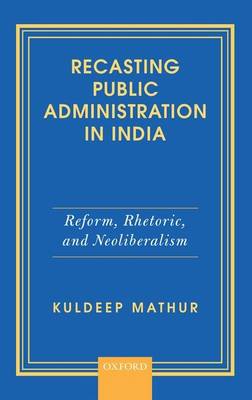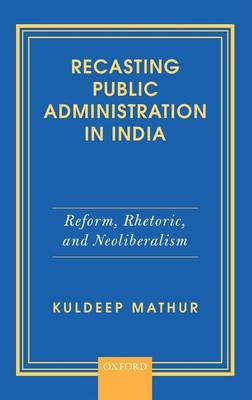
Door een staking bij bpost kan je online bestelling op dit moment iets langer onderweg zijn dan voorzien. Dringend iets nodig? Onze winkels ontvangen jou met open armen!
- Afhalen na 1 uur in een winkel met voorraad
- Gratis thuislevering in België vanaf € 30
- Ruim aanbod met 7 miljoen producten
Door een staking bij bpost kan je online bestelling op dit moment iets langer onderweg zijn dan voorzien. Dringend iets nodig? Onze winkels ontvangen jou met open armen!
- Afhalen na 1 uur in een winkel met voorraad
- Gratis thuislevering in België vanaf € 30
- Ruim aanbod met 7 miljoen producten
Zoeken
Recasting Public Administration in India
Reform, Rhetoric, and Neoliberalism
Kuldeep Mathur
Hardcover | Engels
€ 48,45
+ 96 punten
Omschrijving
This book is an important contribution to critical literature on public administration in India. It examines efforts at administrative reforms and the shifts that created new institutions and practices that are being planted on the existing foundations inherited from colonial rule. It provides an account of the unsuccessful attempts at administrative reform during the plan period in spite of advice of numerous committees and commissions and reports of international experts. It identifies the role of the political leadership in eroding its professed values of neutrality and professionalism and turning it into an instrument of achieving its own political goals. The adoption of neo-liberal policies for development are examined in how they changed the perspective on reform, and new institutions within this paradigm began to be installed without changing the existing ones. The book argues that hybrid architecture for delivering public goods and services has been the most significant transformation to be institutionalized in the current era. This is marked by the blurred boundaries between public values of access and equity and the interests of private profit, as well as the erosion of democratic accountability. With the diminishing ability of serving the public interest, these trends open up critical questions of whose interests does the State serve, and whether it still makes sense to call it 'public administration'.
Specificaties
Betrokkenen
- Auteur(s):
- Uitgeverij:
Inhoud
- Aantal bladzijden:
- 200
- Taal:
- Engels
Eigenschappen
- Productcode (EAN):
- 9780199490356
- Verschijningsdatum:
- 17/03/2019
- Uitvoering:
- Hardcover
- Formaat:
- Genaaid
- Afmetingen:
- 145 mm x 221 mm
- Gewicht:
- 340 g

Alleen bij Standaard Boekhandel
+ 96 punten op je klantenkaart van Standaard Boekhandel
Beoordelingen
We publiceren alleen reviews die voldoen aan de voorwaarden voor reviews. Bekijk onze voorwaarden voor reviews.











